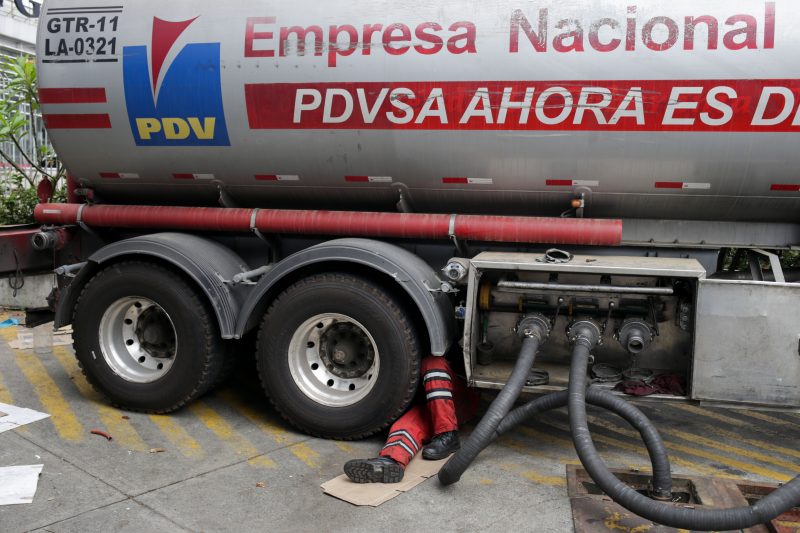The slippery slope for Venezuela’s oil output gets steeper
Venezuela’s oil production has nose-dived in the face of a crippling blackout and ever-tightening US sanctions during an already dire political and economic crisis (Cristian HERNANDEZ)
Caracas (AFP) – A weeklong blackout and ever-tightening US sanctions have nudged Venezuela’s already declining oil production into an even steeper dive, experts say.
Even before the massive, unprecedented power cut swept across the South American nation on March 7, Venezuela’s outlook for its one vital export resource was grim, with the state-owned oil company PDVSA in default and under sanctions pressure.
From April 28, US companies and citizens will be barred from dealing in Venezuelan crude, effectively cutting PDVSA off from its biggest customer.
Oil expert Luis Oliveros said “not a barrel was shipped during the blackout,” paralyzing the oil sector and marking “the start of a bigger cycle of deterioration.”
– Long decline –
Venezuela’s crude output has slipped for years, and in February was calculated by secondary OPEC sources to amount to a million barrels a day — 142,000 less than a month earlier and a fraction of the 3.2 million barrels pumped a decade ago.
Observers say the blackout’s damage to the sector could trigger even more sharp cuts to production.
It could go as low as 500,000 barrels a day, according to Asdrubal Oliveros, an economist and director of the economic analysis firm Econometrica, citing a report by British financial services outfit Barclays.
Such a figure — staggeringly low for a country with the largest proven oil reserves in the world — would put Venezuela on par with minor OPEC member Ecuador, or non-member Romania.
PDVSA has not revealed the impact of the electricity cut on its operations. It said only that it managed to meet domestic demand for gasoline after long lines of cars formed at service stations.
On Thursday, however, more bad news hit the company when three storage tanks at a heavy-oil processing plant in the east caught fire. The government claimed it was a “terrorist attack” organized by arch-foe the United States.
President Nicolas Maduro also blamed the blackout on US “cybernetic and electromagnetic attacks.”
Experts, though, discount that possibility and say chronic neglect of Venezuela’s infrastructure means more dysfunction of the power grid and oil production will occur again.
– US pressure –
Bringing oil installations back online after the blackout will not be easy, Luis Oliveros said, explaining that knock-on effects would be felt for some time.
“The damage to the (oil) wells, in some cases, are irreversible. And in others major investment will be needed to make them operational. The impact is going to be very hard,” he said.
According to oil sector monitoring firm Baker Hughes, Venezuela has 26 oil platform left functioning, down from 47 a year ago. In 2014, the number was 74.
US President Donald Trump has intensified measures against Maduro’s regime and PDVSA as he tries to swing support behind Juan Guaido, the head of Venezuela’s opposition-ruled congress who is recognized as interim president by some 50 countries.
The aim is to shore up Guaido and seek to shear away military chiefs and others who are propping up Maduro.
After blocking PDVSA from getting new credit by issuing bonds, Trump has frozen PDVSA assets and accounts and started targeted companies dealing with it, including a Russian bank, Evrofinance Mosnarbank.
“We think export revenues could fall to as low as $1 billion per month by year-end (from an average of $3 billion last year). That will make it very difficult for Mr. Maduro keep his inner circle intact,” the economic research firm Capital Economics said in a briefing note.
Disclaimer: This story is published from a syndicated feed. Siliconeer does not assume any liability for the above story. Validity of the above story is for 7 Days from original date of publishing. Content copyright AFP.


